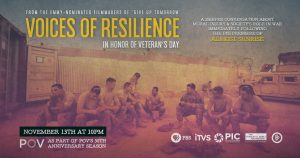
For Americans who take Veterans’ Day seriously, it’s a time to honor those who have served in the military—particularly those who have made “the ultimate sacrifice.” I suspect that for most us though, today is primarily an occasion for a three-day weekend. That’s generally been my perspective, in part because honoring vets is too often confused with endorsing US military policies. But this year I find myself reflecting upon Veterans’ Day in the context of our course.
This Monday, PBS will premier a documentary about two veterans and their journey of recovery. I doubt that Almost Sunrise ever mentions the Anthropocene but its primary themes—moral injury, resilience, and the restorative power of contemplative practice and community—go right to the heart of our course.
Thanks to researchers and media coverage, post-traumatic stress disorder (PTSD) has become a household term: both body and mind carry the residue of traumatic experiences long after those experiences are over. Moral injury is beginning to receive similar attention. According to Syracuse University’s Moral Injury Project, moral injury is the damage done to one’s own conscience when one perpetrates or fails to prevent acts that violate one’s own ethical values. Not surprisingly, veterans returning from the War on Terror (costing $5.6 trillion as of FY2018) are receiving most of the attention.
My mind goes to Roy Scranton’s Learning to Die in the Anthropocene. Given Scranton’s experiences in Iraq, might we read it as an eloquent effort to heal his own moral injury? And what about the rest of us: those of us who will never go to war but whose everyday actions contribute to the unraveling of planetary life-support systems? Given that the vast majority of people believe that human-induced climate change is real, are we not experiencing moral injury on a civilizational scale?
But “Almost Sunrise” is not a downer; nor, I hope, is this course. It is about resilience: the capacity to take a hard look at reality and “bounce back.” Yet, as we’ve learned, resilience is not an individual trait; rather it’s a trait of socio-ecological systems. While we each constitute a living system, our lives are utterly dependent upon a vast planetary web of relationships. It was through deeply recognizing this radical embeddedness, a process involving contemplative practice, community support and a 2700-mile transcontinental walk, that the two vets in “Almost Sunrise” found healing. What might we learn from them?
Image Credit: https://twitter.com/almost_sunrise
